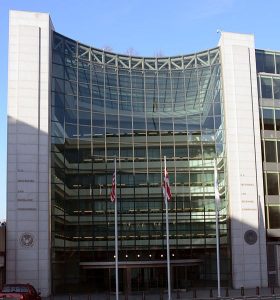SEC obtains emergency asset freeze to stop ICO

US Securities and Exchange Commission headquarters in Washington, D.C.
United States federal government agency the Securities and Exchange Commission (SEC) announced in a press release it sent to CoinReport that it had obtained an emergency asset freeze to put a stop to a fast-moving Initial Coin Offering (ICO) scam that had raised up to $15 million from thousands of investors since August by falsely promising a 13-fold profit in less than a month.
The SEC filed charges in federal court in Brooklyn, New York, against a recidivist Canadian securities law violator, Dominic Lacroix, and his company, PlexCorps.
The SEC’s complaint alleges that Lacroix and PlexCorps marketed and sold securities called PlexCoin on the Internet to investors in the U.S. and elsewhere, asserting that investments in PlexCoin would pay a 1,354 percent ROI in less than 29 days.
The SEC also charged Lacroix’s partner, Sabrina Paradis-Royer, concerning the scheme.
The charges are the first filed by the SEC’s new Cyber Unit. The unit was formed in September to center the Enforcement Division’s cyber-related proficiency on misconduct related to blockchain/distributed ledger technology and initial coin offerings, the spread of untrue information via electronic and social media, hacking and threats to trading platforms.
Robert Cohen, the chief of the SEC’s Cyber Unit, said in the press release we received, “This first Cyber Unit case hits all of the characteristics of a full-fledged cyber scam and is exactly the kind of misconduct the unit will be pursuing.
“We acted quickly to protect retail investors from this initial coin offering’s false promises.”
The SEC, based on its filing, got an emergency court order to freeze the assets of PlexCorps, Lacroix and Paradis-Royer.
The complaint by the SEC charges Lacroix, Paradis-Royer and PlexCorps with violating the anti-fraud provisions, and Lacroix and PlexCorps with violating the registration provision, of the U.S. federal securities laws.
The complaint pursues perpetual bans, disgorgement plus interest and penalties. For Lacroix, the SEC also pursues an officer-and-director bar and a bar from offering digital securities against Lacroix and Paradis-Royer.
Daphna A. Waxman, David H. Tutor, and Jorge G. Tenreiro of the New York Regional Office and the Cyber Unit conducted the SEC’s investigation with assistance from the agency’s Office of International Affairs. Valerie A. Szczepanik and Mr. Cohen are supervising the case. The SEC says it appreciates the assistance of Quebec’s Autorité Des Marchés Financiers.
It should be noted here that the SEC’s Office of Investor Education and Advocacy issued an Investor Alert in August 2017, cautioning investors about scams of firms claiming to be employing ICOs.
Image credit – Don Ramey Logan (CC BY 4.0)













SEC wants to regulate ICOs. That’s OK, but the rules of the game must be published first. The most tricky question is whether the coin issued is a security token or the utility one.
So it looks like the government wants to tax the crypto money and to control the money transfers.
As for me it is wise to invest inthe start ups like doft.com